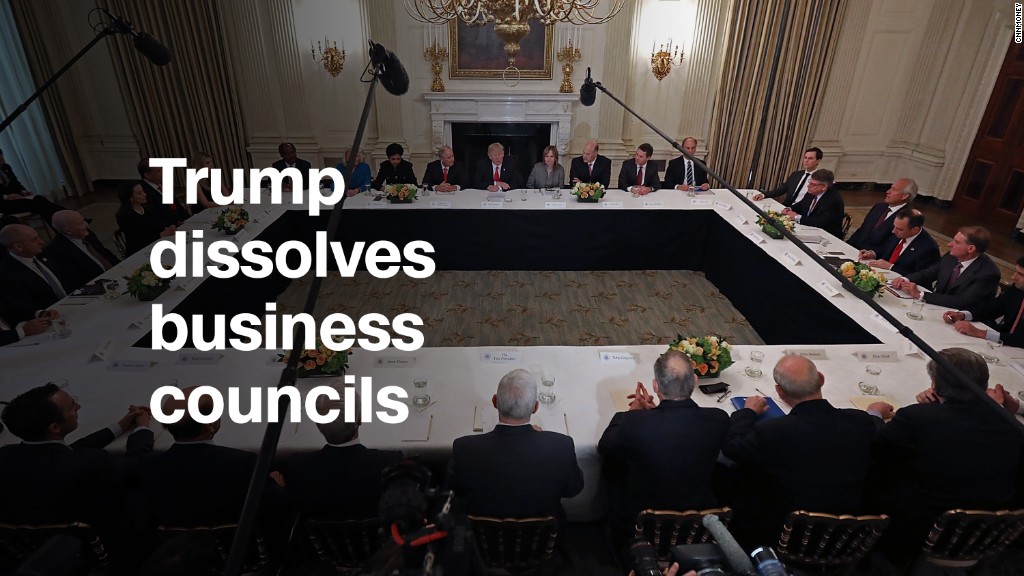
Even before top executives lined up this week to disown President Trump, the alliance between the president and some of the nation's top business leaders was an uneasy one.
Several executives that joined Trump's now-defunct advisory councils did so after they'd already expressed misgivings about him.
Stephen Schwarzman, the CEO of Blackstone and a Republican, referred to Trump as the "P.T. Barnum of America" in a 2015 interview.
And Tesla (TSLA) CEO Elon Musk had a simple answer during the campaign when asked on Twitter if he supports Trump: "No."
The implosion of Trump's advisory councils on Wednesday serves as a stark reminder of these divides. Though many corporate leaders put their discomfort with Trump aside to score a seat at the policymaking table, few lent their unconditional support.
That became very clear once Trump attributed violence at a rally of white supremacists in Charlottesville to "many sides." CEOs began dropping out of the councils until they collapsed.
Related: Stunning rebuke for the CEO president
After the election, chief executives and big companies offered Trump their congratulations and found common ground over their mutual desire to pass corporate tax reform and cut down on Wall Street regulations.
"It is our hope government leaders will focus on bringing the country together and pursuing policies to drive economic growth and job creation," Ford (F) said in a statement in November.
But cracks began to show not long after Trump formed the Strategic and Policy Forum and the Manufacturing Jobs Initiative, both of which brought together "some of America's most highly respected and successful business leaders," the president's team said at the time.
Trump's January ban on travel from some Muslim-majority countries brought widespread condemnation. Many companies were caught off guard by the sudden executive order and had employees who were directly affected.
"We, of course, all want to promote security and combat terrorism, but we believe it needs to be done with respect for due process, individual rights and the principle of inclusion," BlackRock CEO Larry Fink said in a note to employees at the time.
Jeff Immelt, the chairman of General Electric, wrote in January that GE believes "these employees and customers are critical to our success and they are our friends and partners."
After that, the number of issues on which corporate leaders split from Trump started to pile up.
His decision to withdraw from the Paris climate agreement stoked sharp censuring, causing Musk and Disney (DIS) CEO Bob Iger to cut ties with the White House.
Next, tech industry luminaries voiced their disapproval for Trump's plan to stop transgender people from serving in the military.
"I am grateful to the transgender members of the military for their service. #LetThemServe," Google CEO Sundar Pichai tweeted.
But Charlottesville was too much, compelling a wave of CEOs to make the rare move of publicly rebuking a sitting president.
"Racism and murder are unequivocally reprehensible and are not morally equivalent to anything else that happened in Charlottesville," said Denise Morrison, the CEO of Campbell Soup Co., after she resigned from the manufacturing council. "I believe the president should have been -- and still needs to be -- unambiguous on that point."
